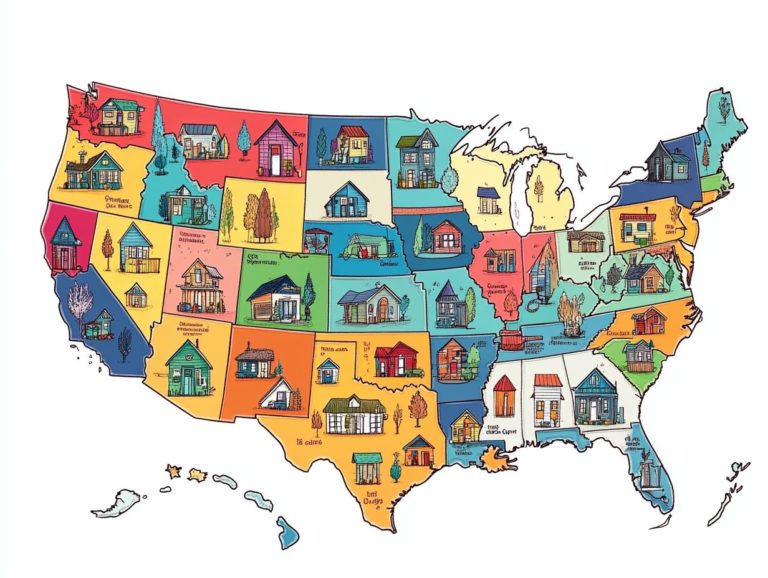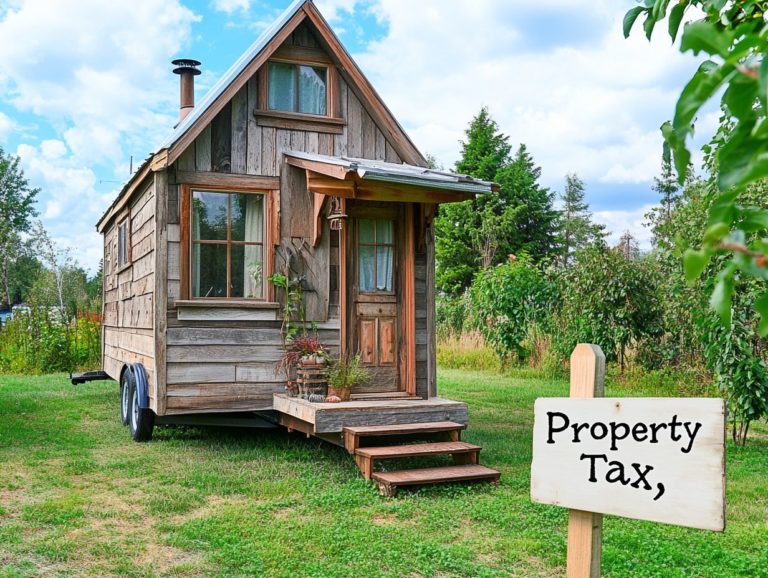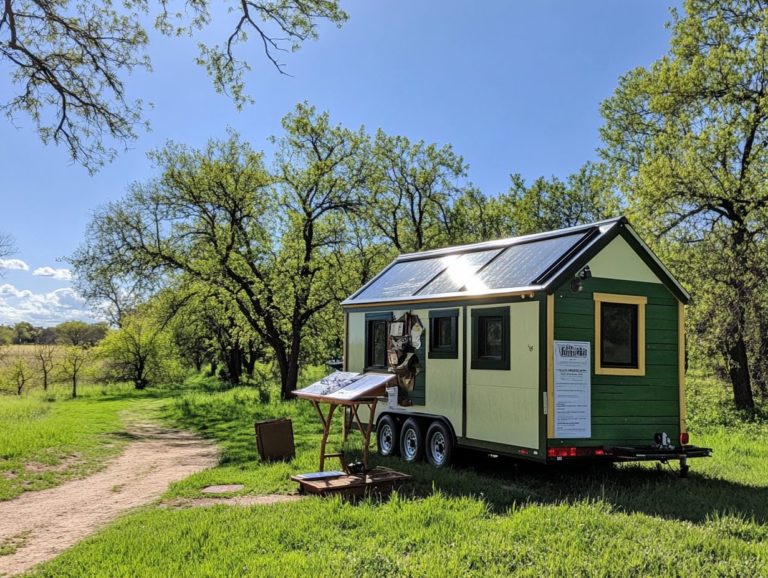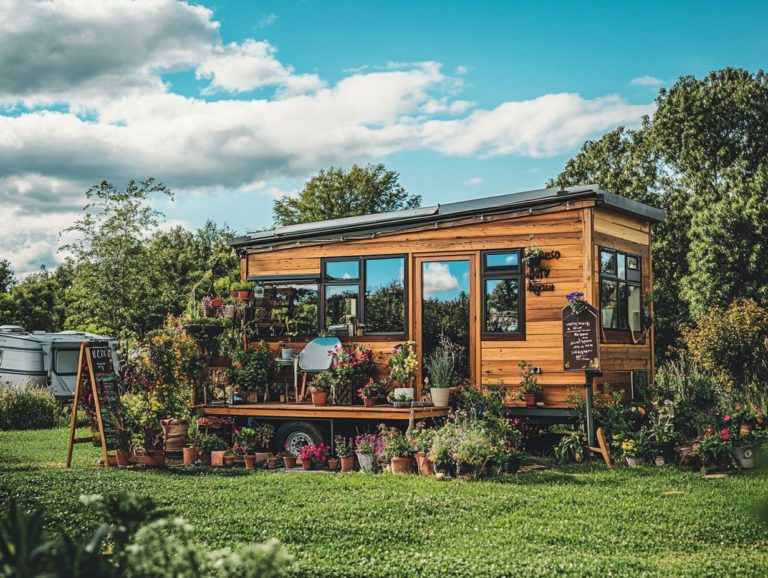Tiny House Rental Agreements: Legal Tips
Join the tiny house revolution! Tiny house rentals are becoming increasingly popular as you seek out minimalist living and unique accommodations. Many travelers prefer these environmentally friendly options over traditional lodging.
Navigating the rental process can present its own set of challenges. A well-crafted rental agreement is essential to protect both landlords and tenants. It clearly outlines responsibilities and expectations, especially for tiny house owners looking to maximize their investment.
This article will break down the key components of a tiny house rental agreement. We will cover important clauses, legal considerations, and practical tips for drafting an effective contract to ensure a seamless vacation rental experience.
You ll also find insights into common issues that may arise. This ensures you’re well-prepared for your tiny house rental journey and equipped to address challenges such as property damage and late payments.
Contents [hide]
- Key Takeaways:
- Key Components of a Rental Agreement
- Legal Considerations for Tiny House Rentals
- Tips for Drafting a Solid Rental Agreement
- Dealing with Common Issues in Tiny House Rentals
- Frequently Asked Questions
- What is a tiny house rental agreement?
- Is a tiny house rental agreement necessary?
- What should be included in a tiny house rental agreement?
- Can a landlord change the terms of a rental agreement?
- What happens if either party violates the rental agreement?
- Is it possible to terminate a tiny house rental agreement early?
Key Takeaways:
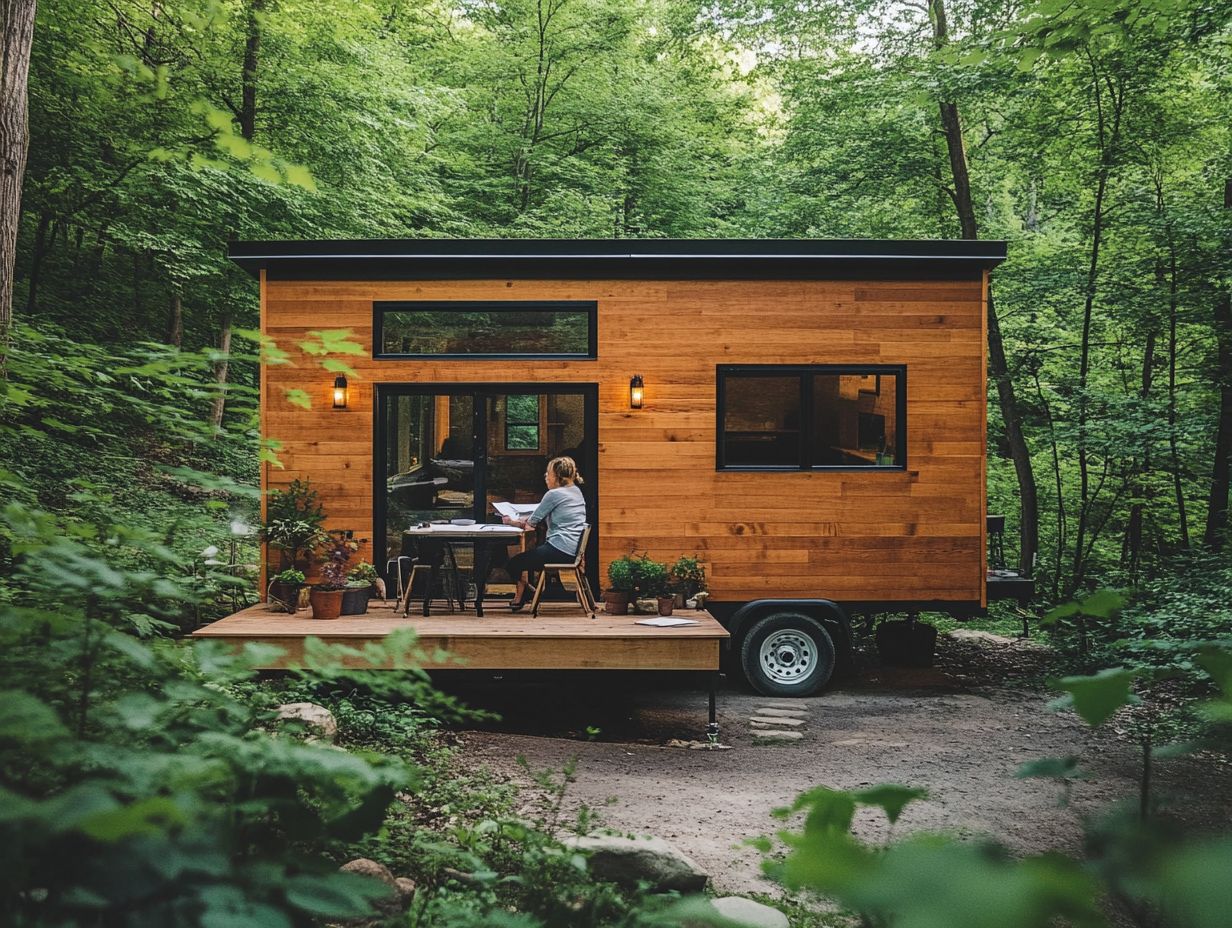
- Include important clauses such as rent amount, security deposit, and maintenance responsibilities in a tiny house rental agreement. This ensures clear communication and avoids disputes.
- Be aware of local regulations and zoning laws when renting out a tiny house. Consider insights from the local planning department and review insurance requirements to protect both parties.
- When drafting a rental agreement for a tiny house, ensure clear communication and set expectations to avoid common issues like late payments and property damage. Incorporate community mediation strategies for effective resolution.
What is a Tiny House Rental Agreement?
Thinking of renting a tiny house? Here s what you need to know! A Tiny House Rental Agreement is a legal document that defines the terms between you, the homeowner, and travelers looking for unique vacation experiences in tiny houses on wheels. This agreement ensures that both parties are clear about their rights and responsibilities.
This is particularly important in the context of the tiny house movement, which has gained traction since the 2008 mortgage crisis. This movement reflects a broader desire for financial freedom and eco-friendly living.
Typically, this document involves you as the homeowner offering your tiny space for rent, with the traveler looking to escape traditional lodging options and experience the charm of tiny homes. With platforms like Airbnb making these rentals easier, having a clearly defined agreement is essential to sidestep misunderstandings. It safeguards the rights of both you and your guests, clarifying rules about damage deposits, check-in procedures, and even community mediation in case disputes arise. For more details, check out what to know about tiny house land leases.
In the realm of tiny houses, where space is often limited and experiences are uniquely tailored, these agreements serve to maintain harmony and foster a positive rental atmosphere.
Key Components of a Rental Agreement
A carefully written rental agreement for tiny houses must encompass essential elements that spell out the expectations of both parties engaged in the short-term rental transaction.
Given the distinctive appeal of tiny homes to contemporary travelers, understanding tiny house residency laws you should know is vital in ensuring that both tiny house owners and renters share a mutual understanding of property usage, responsibilities, and adherence to local regulations.
Important Clauses to Include
When drafting a rental agreement for tiny homes, it’s essential to include certain key clauses that protect both you, the homeowner, and your travelers. This helps keep everything clear and straightforward. Consider addressing critical aspects like:
- Payment schedules
- Cancellation policies
- Responsibilities for cleaning services and maintenance
Incorporating clear terms regarding property damage and the repercussions of late payments is vital. These factors significantly influence your relationship with renters. Ensuring they understand their obligations in the event of damages helps avoid misunderstandings, while setting precise penalties for late payments allows for effective management of financial matters.
Customer feedback is invaluable in shaping these agreements. It offers insights into the tiny house vacation experience and enhances future bookings. By integrating practical elements based on insights from previous renters and homeowners, you can enhance the overall rental experience, including guidelines for tiny house residency regarding which DIY projects are allowed or prohibited on the premises.
Legal Considerations for Tiny House Rentals
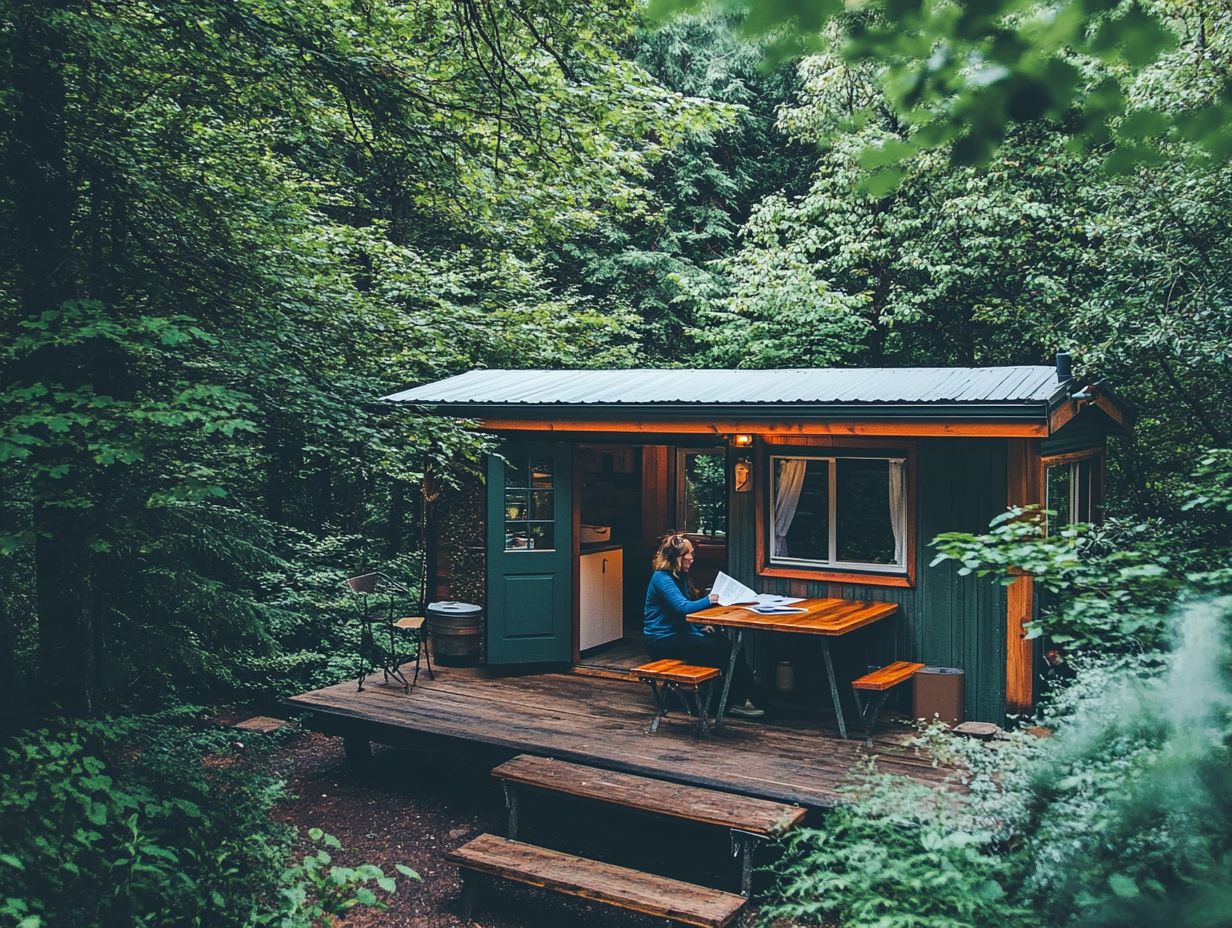
Renting tiny houses involves understanding legal requirements. These rules can vary widely across different areas, especially regarding local regulations and zoning laws, which dictate how land can be used. Grasping these laws is essential for both homeowners and travelers, as it ensures a seamless glamping experience while remaining compliant with property laws and homeowner association guidelines.
Local Regulations and Zoning Laws
Local regulations and zoning laws are crucial to the success of tiny house rentals. They determine where mobile tiny houses can be placed and the conditions under which they can operate, impacting their classification as recreational vehicles or accessory dwelling units. By understanding these regulations, you can maximize your property value while adhering to community standards.
In many areas, local zoning classifications may categorize these homes as recreational vehicles. This classification brings about a range of regulations that differ significantly from one municipality to another. Some regions have embraced the tiny house movement, establishing designated zones where these homes can flourish, while others resist due to concerns over density and infrastructure.
Recent trends indicate a growing interest in community mediation efforts. These efforts aim to foster dialogue between tiny home owners and local officials, working to find common ground. Staying informed about these developments can help you navigate the complexities of local policies with greater ease.
Insurance Requirements
Insuring a tiny house used for vacation rentals involves navigating specific insurance requirements that extend beyond ordinary homeowner policies. It’s vital to secure adequate liability coverage to protect yourself and the travelers enjoying the short-term rental experience, especially given the unique nature of tiny homes.
These distinct features often lead to different liability considerations compared to traditional rental properties. For example, when listing your tiny house on platforms like Airbnb, you need to carefully assess the specific risks involved, such as the limited space and the potential for accidents. Understanding your legal obligations for tiny house owners is crucial. Custom insurance coverage can safeguard you against property damage and personal injury claims that may arise from guests utilizing those compact living spaces.
Moreover, customer feedback regarding safety and comfort can greatly impact your tiny home s success in the rental market. This makes it essential to prioritize comprehensive insurance solutions tailored to your specific needs.
Tips for Drafting a Solid Rental Agreement
When drafting a solid rental agreement for tiny houses, consider a range of important aspects to ensure clarity and mutual understanding between you and your renters.
By employing effective communication strategies and clearly outlining expectations, you set the stage for a seamless and enjoyable tiny house vacation experience for everyone involved.
Start drafting your rental agreement today to set your tiny house up for success!
Ensuring Clear Communication and Expectations
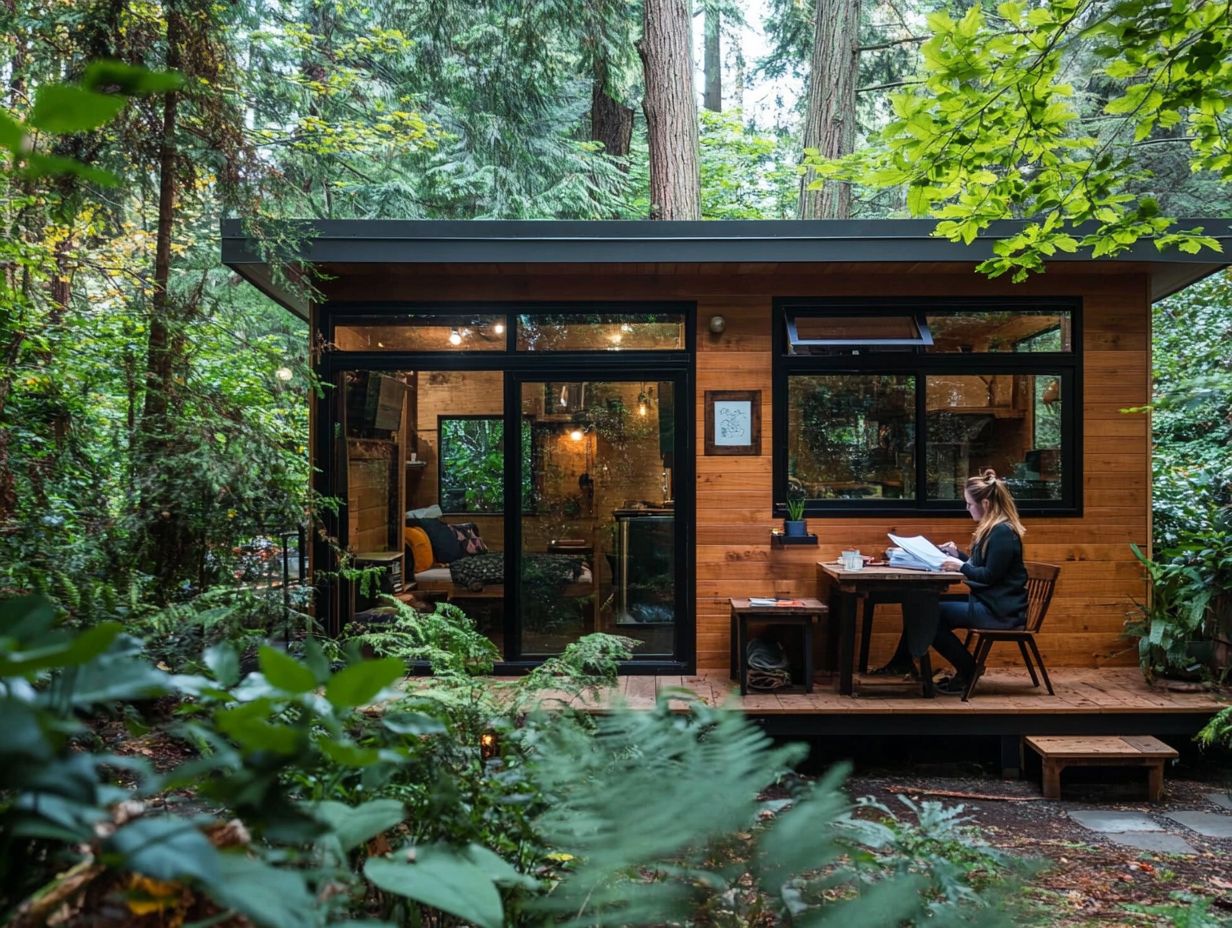
Clear communication and well-defined expectations form the backbone of a successful tiny house rental agreement. This allows you, whether a homeowner or traveler, to fully grasp your responsibilities. Make open dialogue a priority to gather valuable feedback while paving the way for a smooth rental experience.
Establishing a clear understanding fosters trust and mitigates potential conflicts that may arise during the rental period. For instance, discussing the specifics of DIY projects can enable renters to personalize their space while ensuring alignment with your vision as a homeowner.
As the tiny house movement continues to flourish, recognizing the unique needs of both parties is essential. This approach enhances satisfaction and encourages repeat bookings, as both you and the renters will appreciate a seamless, well-communicated arrangement.
Dealing with Common Issues in Tiny House Rentals
Addressing common issues in tiny house rentals is crucial for ensuring a seamless experience for both homeowners and travelers.
Challenges such as property damage and late payments often emerge unexpectedly. However, you can navigate these hurdles with ease. By taking action ahead of time emphasizing clear agreements and open communication you can effectively mitigate these problems and enhance the overall experience for everyone involved.
Addressing Late Payments and Property Damage
Addressing late payments and property damage is crucial when managing tiny house rentals. These matters can significantly influence the rental experience for everyone involved. By establishing clear terms in your rental agreement and keeping lines of communication open, you can tackle these challenges quickly and effectively.
Incorporating customer feedback into your management strategy offers valuable insights into your tenants’ experiences, enabling you to make informed adjustments. Setting clear expectations from the outset regarding payment timelines and property conditions helps to eliminate potential misunderstandings.
Implementing a straightforward invoicing system as a method to bill tenants for their rent along with regular reminders can also reduce the likelihood of late payments. Conducting thorough check-in and check-out inspections further minimizes disputes related to property damage. By emphasizing transparency and accountability, you can cultivate a more harmonious rental relationship with your tenants. Additionally, understanding tiny house zoning can help you navigate legal challenges in your rental agreements.
Handling Disputes and Terminations
Handling disputes and terminations in tiny house rentals demands a solid grasp of the rental agreement and local regulations to effectively navigate any conflicts that may arise. By establishing a clear framework for dispute resolution, you can ensure that both parties are treated fairly and transparently.
An effective rental agreement acts as the bedrock for communication, detailing procedures for addressing issues like late payments or property damages. It’s essential for you to familiarize yourself with the local laws governing tenancy, as these regulations can vary significantly depending on your location. For those considering tiny homes, understanding tiny house zoning issues is particularly important as well.
Maintaining a meticulous record of tenant interactions and property conditions can be invaluable should disputes escalate. Being proactive by incorporating mediation clauses into your agreement can lead to smoother resolutions, ultimately enhancing the rental experience for everyone involved.
Frequently Asked Questions
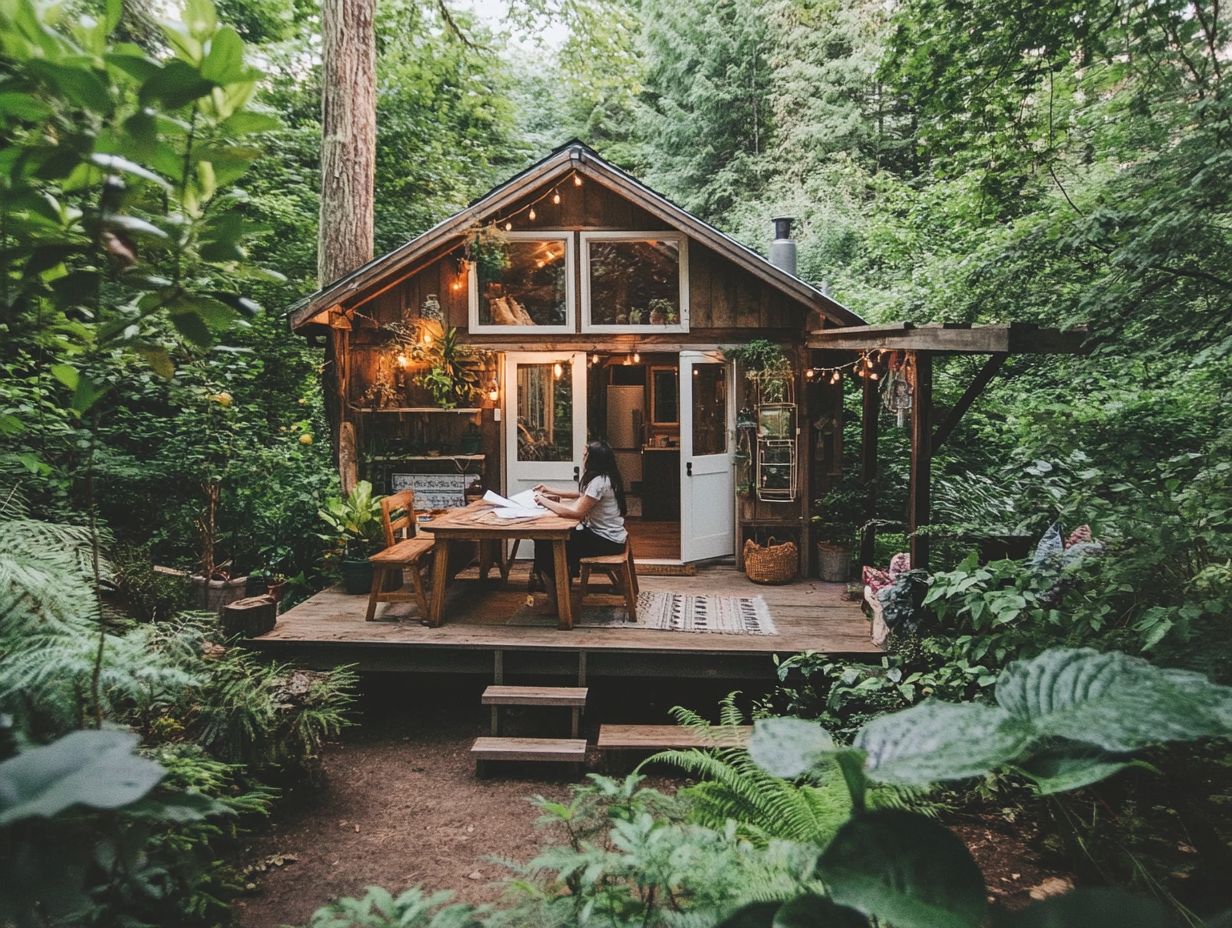
What is a tiny house rental agreement?
A tiny house rental agreement is a legally binding contract between a landlord and tenant for the rental of a tiny house. It outlines the terms and conditions of the rental, including the rent amount, utility responsibilities, and other important details.
Is a tiny house rental agreement necessary?
Yes, a rental agreement is necessary for both the landlord and tenant to protect their rights and responsibilities. It ensures that both parties are aware of the terms of the rental and can refer to it if any issues arise.
Ready to dive into tiny house rentals? Start your journey today!
What should be included in a tiny house rental agreement?
A tiny house rental agreement must include the names and contact details of both the landlord and tenant.
It should also specify the tiny house’s address, the rent amount, due date, lease length, deposits, and utility responsibilities.
Can a landlord change the terms of a rental agreement?
A landlord cannot change the terms of a rental agreement without the tenant’s consent.
Any changes need to be documented in writing and signed by both parties to be legally accepted.
What happens if either party violates the rental agreement?
If either the landlord or tenant violates the rental agreement, the other party can take legal action.
This could lead to eviction for the tenant or financial penalties for the landlord.
Is it possible to terminate a tiny house rental agreement early?
Absolutely! You can terminate a rental agreement early if both parties agree.
Make sure to follow the terms in the agreement, as fees or penalties might apply.

